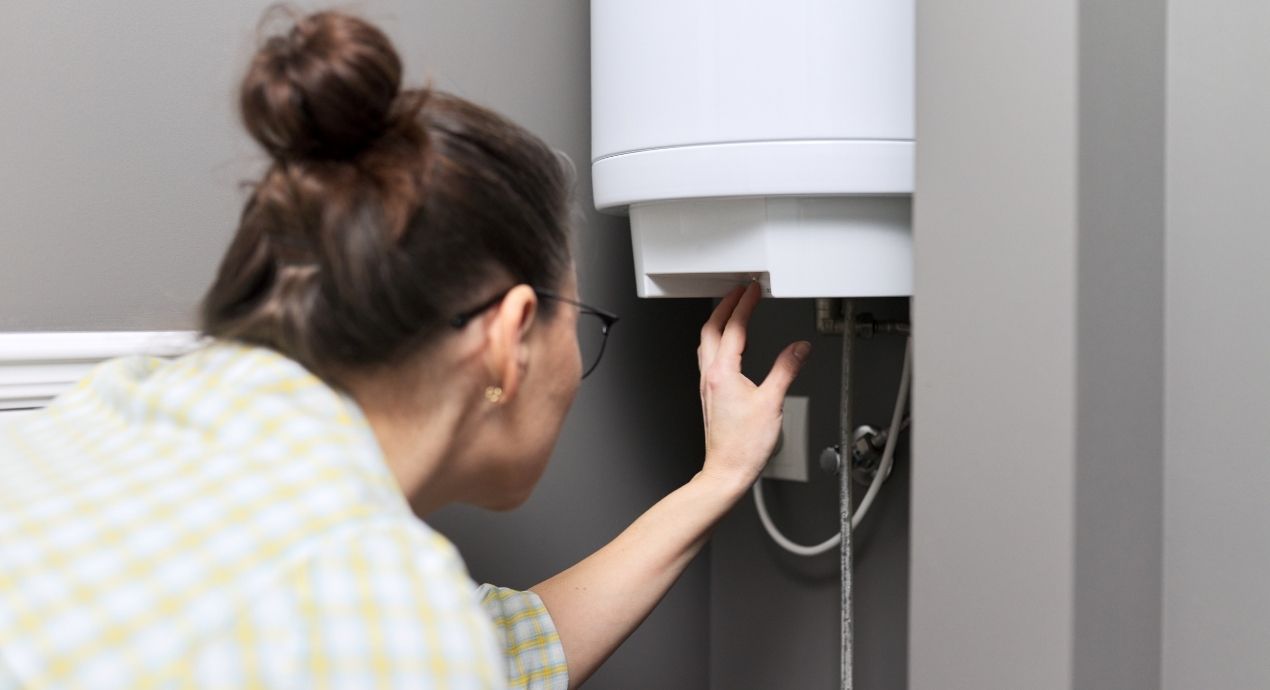
Contemplating coverage?
Subscribe to receive our emails & get
$200 off!
Have questions?
Call us: (833) 544-8273


Written By Erin Easley
The water heater is one of your home’s most significant workhorses. Keeping it in good condition is imperative. Malfunctions will arise from time to time for a variety of reasons, but with a few tools and a little bit of elbow grease, you’ll be able to resolve many issues on your own. In this post, we’ll review some common water heater issues and go over how to check hot water heater components to resolve them.
As always, safety first. Make certain that your water heater is disconnected from its power source before you attempt to make any repairs. Use caution even when it’s unplugged.
You’re about to hop in the shower when you discover the water is ice cold. What causes the hot water to stop working?
An electric hot water heater not heating as its supposed to is often not drawing power. A lack of hot water can also be due to a faulty thermostat or heating element.
The first step is ensuring your water heater is getting power. Look over your water heater to identify any signs of power, such as lit indicator lights. If there’s no visible sign that the water heater is connected to a power source, confirm that the power switch is in the “on” position. If the device is turned on but there are still no signs of power, check that the power cord is plugged in.
If your water heater is plugged in and turned on and is still not drawing power, the problem could be your circuit. Reset the circuit at the breaker to restore power.
If you can tell that your water heater is drawing power but not producing hot water, the problem is likely a faulty thermostat or heating element that needs to be replaced. Unless you’re thoroughly experienced in water heater maintenance and repair, we recommend calling a professional to replace such components.
Electric water heater thermostat problems can also mean your water gets too hot. If your water heater is working a little too well, consult the appliance manual to confirm the recommended thermostat setting. This is typically between 115°F and 125°F.
To adjust your water heater’s thermostat, you may have to remove an access panel. Your appliance manual should provide the information you need. Just be sure not to touch any wiring or other components that you’re not familiar with. Turn down your thermostat as necessary and your problem will likely be resolved.
Water heater leaks can have several causes. A common problem is a loose plumbing connection. Scan your water heater to determine where the water appears to be coming from. If it’s leaking from a specific plumbing connection, valve, or heating element bolt, try to tighten as necessary with a wrench. Take care to not overtighten.
If the source of the leak isn’t immediately obvious, the cause could be high water pressure or a defective gasket. In both cases, it’s a good idea to call a plumber to resolve the problem.
Sometimes, the water tank itself could be the source of the leak. If your tank is corroded and no longer watertight, you will need to replace it entirely.
Bear in mind that you should never leave a leaking water heater unattended. You never know when the leak will worsen, and water damage can wreak havoc on your home. If you notice a leak that you can’t immediately fix, power off your water heater and drain the tank until a professional can attend to it.
A noisy water heater is caused by sediment buildup. You can sometimes resolve this by draining the tank and cleaning it. In some cases, you may need to replace the tank.
Brown or rust-colored water is likely another symptom of tank or pipe corrosion. It’s also possible that iron or other sediment is in your main water source. If you notice discoloration only when running hot water, your water heater is the culprit. If your water is discolored regardless of temperature, the problem is with your well or municipal water supply.
Some homeowners notice sulfur-like smells from their water. This is caused by bacteria in your water heater’s tank. You can resolve this by flushing the tank, cleaning it, and replacing the anode rod.
You can resolve many water heater problems on your own, but some require professional help. A water heater home warranty from Liberty Home Guard can help stay on top of maintenance and avoid excessive out-of-pocket repair costs.
Reach out to our team to find the right plan for you. Call (866)-526-1752 or use our website for a free quote.
Stay Ahead of Potential
Home Mishaps!
Subscribe to our Liberty Home Guard Newsletter and gain access to exclusive content that ensures your peace of mind.